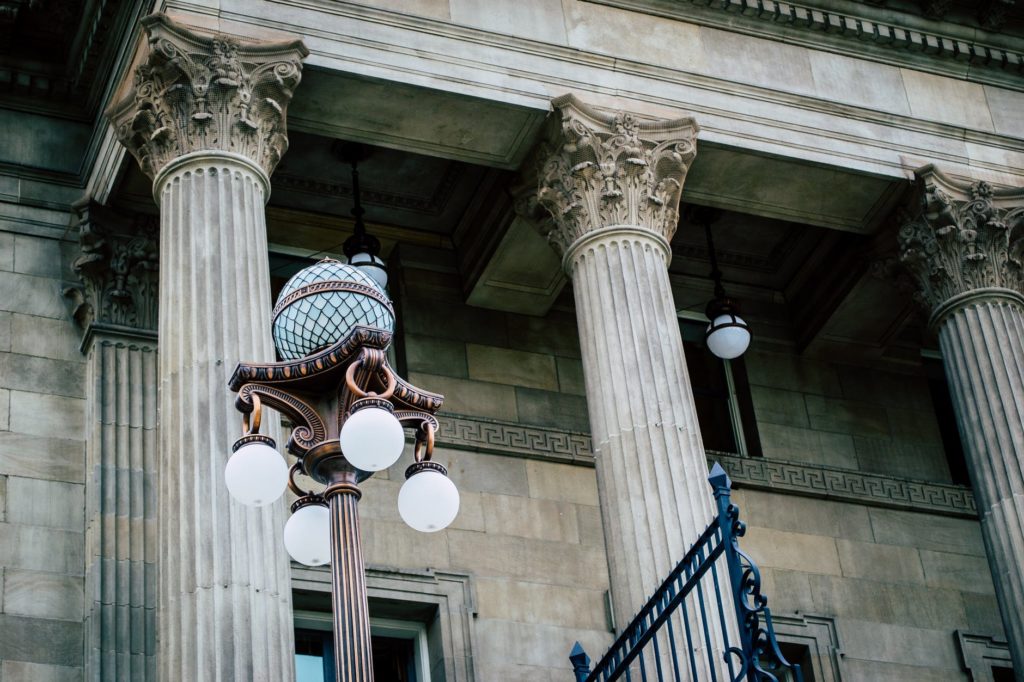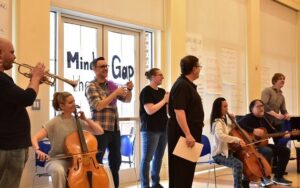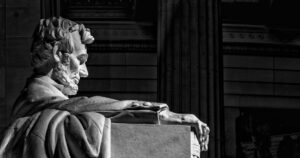There is an anti-authoritarian streak in American culture that many of us love, at least in some of its forms. This is hardly surprising in a country whose creation began with a revolt against taxes. But on top of that, our history of exploring frontiers, our admiration for entrepreneurs and self-made men, our reverence for people who break rules (even if those individuals are not always celebrated in their own time), is pretty unusual among modern, wealthy democracies. This defiant attitude isn’t limited to the rich and powerful members of our society, people with the resources (and often the sense of entitlement) that allow them to do things most of us can only dream of. It’s far more common than that, and unfortunately it often leads us to devalue two key groups of public servants: police officers and teachers.
American popular culture shows our ambivalence regarding these authority figures very well. There are plenty of classic movies and TV shows featuring police officers, not all of them portraying people with badges in a positive light. There are the honest, hard-working, selfless cops in Dragnet, Law & Order, Fargo and The Departed, but also the crooked and brutal cops in The Godfather, American Gangster, and any number of other stories about organized crime. As for schools, there’s the heroic teacher inspiring cynical students in Stand and Deliver, but there’s also the droning teacher and the inept, authoritarian principal made a fool of by a rebellious student in Ferris Bueller’s Day Off. Many of us, when we think back to our school days, can probably remember at least a few teachers we respected greatly and whose lessons have stuck with us, but also some we viewed as dull, cruel, or just plain ridiculous.
Now take this ambivalence, and add the deep political polarization of our times. Progressives, with their concern for social justice and their anger at the killings of unarmed black men, are often quick to see police as the enforcers of racism in America. Meanwhile conservatives, with their worry that highly educated, influential people have contempt for them and their values, are often quick to regard teachers as the indoctrinators of the young into left-wing politics. Add the fact that teachers’ unions are major supporters of Democrats, and that police organizations are unusual among public sector unions in frequently supporting Republicans, and you have a recipe for constant distrust, outrage, and condemnation. The people who suffer from it are the ordinary citizens our public institutions are meant to serve.
All of this obscures the far more complex truths about public servants, and about those who rally to their defense. Most conservatives are critical of movements like Black Lives Matter not out of racism, but because they have an intrinsic respect for police. The fact that respect for order and for blue uniforms comes to them more easily than does a left-wing sense of racial justice does not make them bad people, just as condemnation of police violence is not the same as condemnation of all cops.
Likewise, when progressives oppose things like charter schools and school choice, most of them are not motivated by a desire to hold children in place, but because they fear anything that might conceivably harm teachers. The fact that they have more confidence in the ability of traditional public institutions to educate children does not mean they hate innovations in schooling, just as criticizing weaknesses in public school systems is not the same as criticizing public education as a whole.
People on the Red side view cops as the noble defenders of law and order, the preservers of a good society. People on the Blue side view teachers as the instillers of knowledge and values, the molders of good citizens. Neither is wrong, and however much room for improvement there may be in both these lines of work, both are essential to America.
It is not healthy for our democracy that one side of our great political divide tends to revere teachers and distrust police, while the other side tends to revere police and distrust teachers. It would be far better if there were a greater consensus on the value of public service, the benefits both institutions, with all their flaws, bring to Americans. Something that would probably help reach that consensus would be offering ways for more Americans to choose public service, even for a short period of their lives.
Our society asks too much of police, in no small part because we ask too little of ourselves. We refuse to invest adequately in things to improve the life chances of low-income, disproportionally black and Hispanic youth – child care for new mothers, affordable housing, clean water, middle-income job opportunities, the chance for parents to move to neighborhoods with better life chances for their kids if they want. The vast majority of kids who grow up with these problems do not commit crimes, but they are the primary victims of the small percentage that do. We let all these problems fester, and then we tell the police to contain the results.
We don’t invest in public goods partly because we don’t want our taxes to go up. That just makes the problem worse, because state and local governments then rely on fines as major revenue sources. Local police get pressured to collect that revenue mainly from poor and minority residents. When they can’t afford the fines, many take out payday loans. Cash bail makes the problem worse still, burdening people with debts even if they are never convicted of a crime.
We ask too much of teachers, too. While it’s easy to think they have it easy, not having to work in the summer and getting to go home at 3 PM, the truth is their jobs are far more difficult than that. Outside the classroom, they spend many hours developing lesson plans, and the most dedicated among them take extra time to help students who are falling behind in class. And at schools that struggle with budget constraints, teachers often pay for supplies out of their own pockets.
It is also not fair to blame teachers for the unequal racial distribution of children suspended and expelled from school. It is common among progressives to blame implicit, unconscious bias among teachers, especially white teachers, for the fact that black students are more likely to be disciplined for misbehavior in schools than white students. But the existence of the gap is not necessarily a sign of bias. A study by experts from American University and UC Davis – not exactly right-wing institutions – studied the effect that having black teachers instead of white teachers has on children’s chances of being suspended. With a black teacher, a black student was only two percent less likely to be punished. If black students are, on average, more likely to misbehave (and the ones who do make it more difficult mostly for other black students to learn), most likely the blame belongs with the same social failures that force police to contain the results of underinvestment in our fellow citizens.
I could go on a rant here about how Americans are undertaxed, about how all of us (especially the affluent among us, but not only them) should be willing to pony up to invest in America’s kids. But I’ll spare the reader that. What I will do, though, is talk about something that, while it would only be part of the solution to ongoing problems, could help narrow these gaps somewhat: service opportunities.
Since 1989, Teach for America has brought bright young college graduates into classrooms in disadvantaged areas around the country. Rather than immediately starting along a traditional, perhaps unfulfilling career path, these dedicated citizens devote two years to making a difference in children’s lives. TFA has sometimes been criticized as displacing long-serving teachers with people who will quickly move on to other things. But as one TFA alum has pointed out, “members fill vacancies in schools that many teachers want to avoid, or that are saddled with the least-skilled and effective teachers.” Whatever its flaws, this is an organization worth having around.
What if there was an equivalent of TFA for cops, Police for America? It could recruit recent college graduates to spend two years patrolling a neighborhood, interacting with the community while keeping it safe and orderly. While it would not be a substitute for any worthwhile changes to police practices, an organization like this would have the added benefit of giving its members, especially the ones from elite colleges, a greater understanding of the lives of their fellow Americans. In late 2014, as our country’s debates about race and policing were initially ramping up, Daily Beast columnist Keli Goff rightly lamented that, “we as a society don’t expect, nor do we encourage, our best and our brightest to become police officers. Young people who are perceived as smart and compassionate, and who exhibit leadership qualities are encouraged to go into politics, the non-profit world, possibly business, or perhaps law, but only to become lawyers.”
As natural as it is for Americans to distrust authority figures of one kind or another, we must never forget that there are guardrails in our society for good reasons. Teachers are guardrails against ignorance and laziness, while police officers are guardrails against the temptation of humans to harm other humans. As we struggle with divisive but vital issues in our deeply polarized era, an appreciation for the service of these two groups is one thing that can, and should, unite us.





1 thought on “Cops and Teachers: Underappreciated Public Servants”
This is a very thoughtful essay that should make us pause to think more about public goods and how to value them. I think blaming this on the desire for lower taxes is not really the issue, which is more about accountability for how tax dollars are spent. Most of the public budgets for these services now go to legacy costs of union benefits granted by politicians in return for votes. The taxpayers naturally resent the fact that they had no one really representing their interests at the bargaining table. Unfortunately, there’s no easy way to reverse this perceived injustice except to cut off the revenue flow. And when comparing public to private compensation, we wrongly focus on wages rather than who bears contingent risks going forward. The ironclad rule of finance is he who bears risks must get paid while he who doesn’t, doesn’t. We all tend to overlook this reality because it’s in our nature to want to have our cake and eat it too.